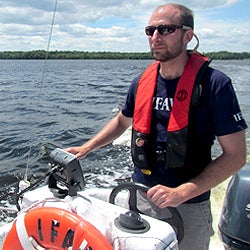C.T. Harry gets calls from his office at all hours—responding quickly to those calls is an important part of his job. As a leader of the International Fund for Animal Welfare’s marine mammal stranding response team, he comes to the aid of whales, seals, dolphins and porpoises that become stranded on beaches throughout Cape Cod and southeastern Massachusetts.
“The beauty of this gig is that no two days are ever the same,” said the recent Graduate School of Oceanography graduate. “I could be analyzing data in the office one minute and get a call about a live dolphin stranded out at Wellfleet, and I just have to pick up and go.”
In his master’s thesis, C.T. analyzed the frequency of dolphin strandings in the Northeast and linked it to variations in the North Atlantic Oscillation, an atmospheric phenomenon that creates fluctuations in atmospheric pressure over the North Atlantic and affects weather patterns and oceanographic currents.
“I wanted to take a step back from the health aspect of why animals strand and look at whether there were broader scale climatological or oceanographic correlations that could influence dolphin strandings on a longer-term scale,” he said.
C.T. became interested in marine mammal strandings when he worked at the Virginia Aquarium and volunteered for its stranding program, which focused mostly on bottlenose dolphins and sea turtles. He spent four summers racing around the barrier islands looking for beached turtles and trying to determine why they stranded.
Marine mammals may strand for any number of reasons. Sometimes it’s health related, but it could be that their navigational abilities have been compromised. Strandings may also be an indication that something is going wrong in the larger marine ecosystem.
“Marine mammals are sentinel species,” C.T. said. “If we start seeing a lot of animals that wash ashore showing signs of similar pathologies, then that may be an indication that something bigger is wrong in their environment.”

